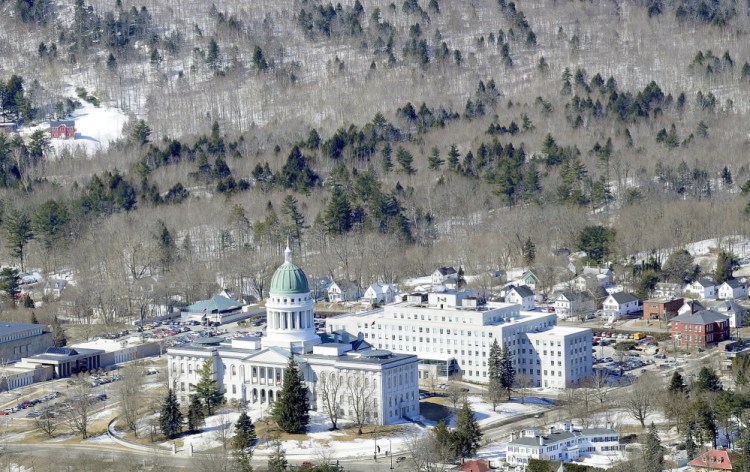The LePage administration is raising concerns about three projects slated to receive funding from the Land for Maine’s Future program, including a 164-acre Augusta land deal often in the governor’s crosshairs.
Jonathan Labonte, director of the governor’s Office of Policy Management, is asking the Land for Maine’s Future board to review and potentially conduct new land value appraisals for Howard Hill in Augusta, Clapboard Island in Falmouth and Kittery’s Brave Boat Headwaters.
Gov. Paul LePage has been sharply critical of some land conservation efforts in Maine and delayed the sale of voter-approved bonds for Land for Maine’s Future as the program became a political football in Augusta.
In a June 15 letter to board Chairman Patrick Keliher, Labonte expressed concerns “that some projects slated for closing in the first quarter of fiscal year 2017 may have appraisal values that raised significant enough issues to impact project budgets and in turn LMF grant amounts.”
“In the interest of protecting each taxpayer dollar in this program, we would urge the board to have all outstanding questions resolved up to and including a new appraisal before any payments are made,” Labonte wrote.
The board’s Appraisal Oversight Committee plans to review Labonte’s letter and accompanying reports before reporting back to the full board, possibly during the September meeting. But Keliher, who is commissioner of the Maine Department of Marine Resources, and Neil Piper, chairman of the Appraisal Oversight Committee, said Tuesday that many of Labonte’s concerns have been raised previously and addressed.
“I want to make sure that we as a board are comfortable with the work we are getting and the appraisals that we are receiving,” Keliher said. “And I think the Appraisal Oversight Committee, in my belief, has done a fantastic job drilling down into and recognizing many of the concerns that have actually been addressed on these projects.”
The highlighted projects do not appear arbitrary.
The governor has repeatedly cited the Howard Hill project – just a few blocks from the Maine State House – and less frequently Clapboard Island as examples of how Land for Maine’s Future is providing taxpayer money to wealthy landowners or conservation groups.
He also sought to use LMF bonds as political leverage with lawmakers – a decision that left dozens of conservation projects in limbo and forced some projects to take out loans or negotiate extensions with landowners.
LePage’s critics have, in turn, accused the governor of violating the will of the voters by delaying bond sales and politicizing a popular program that has protected natural landscapes, farms and working waterfronts across Maine.
Howard Hill is a $1.2 million project to provide permanent recreational access as well as wildlife habitat on 164 acres that serve as the forested backdrop for the state capitol building.
The Kennebec Land Trust received LMF approval for $337,500 toward the project cost and raised another $925,000 to purchase the land.
In his letter, Labonte said the independent review found that the original appraisal submitted to the board contained “unsupported statements” to describe the market value of the parcel. The city lists the assessed value of the wooded property as $171,000, but that figure does not include the value of the land if developed, which is one of the criteria that Land for Maine’s Future considers when appraising properties. The Howard Hill property was approved for a 53-lot subdivision in the 1980s and the appraisal provided to LMF listed a value of well over $1,090,000.
Labonte said “highest and best use” section of the appraisal – which factored in the property’s potential value for housing – was “speculative and unsupported.”
LePage has accused the Kennebec Land Trust of paying an inflated price to the landowner, who happens to be the former law partner of Republican Sen. Roger Katz of Augusta, a frequent target of verbal attacks by the governor.
Theresa Kerchner, executive director of the Kennebec Land Trust, said her organization is proud of its work to protect the property and the support it has received from the Land for Maine’s Future board. She said the appraiser who worked on the project is well respected.
“He answered the questions of the Appraisal Oversight Committee last year and I’m sure he will be happy to answer their questions again,” Kerchner said.
Labonte’s letter also questioned the need for funds to protect roughly 15 acres on Clapboard Island, a busy island in Falmouth. The project was a partnership of the Maine Coast Heritage Trust, the Falmouth Land Trust and the Maine Bureau of Parks and Lands.
Finally, Labonte also raised questions about the appraisal methodology for the Brave Boat Headwaters project, which seeks to protect 60 acres that would connect larger conservation lands between the Mount Agamenticus Conservation Project and the Rachel Carson National Wildlife Refuge in Kittery.
Tuesday’s LMF meeting was the first time the board has met since LePage replaced five of the six public members with new appointees. Several members of the previous board had been sharply critical of the governor’s use of bonds as political leverage with lawmakers.
Also, program director Sarah Demers said the state treasurer plans to sell additional bonds this month, making $3.2 million more available starting in July. That money will allow Land for Maine’s Future to move forward with projects that are already in the pipeline and received approval for funding.
Send questions/comments to the editors.




Success. Please wait for the page to reload. If the page does not reload within 5 seconds, please refresh the page.
Enter your email and password to access comments.
Hi, to comment on stories you must . This profile is in addition to your subscription and website login.
Already have a commenting profile? .
Invalid username/password.
Please check your email to confirm and complete your registration.
Only subscribers are eligible to post comments. Please subscribe or login first for digital access. Here’s why.
Use the form below to reset your password. When you've submitted your account email, we will send an email with a reset code.